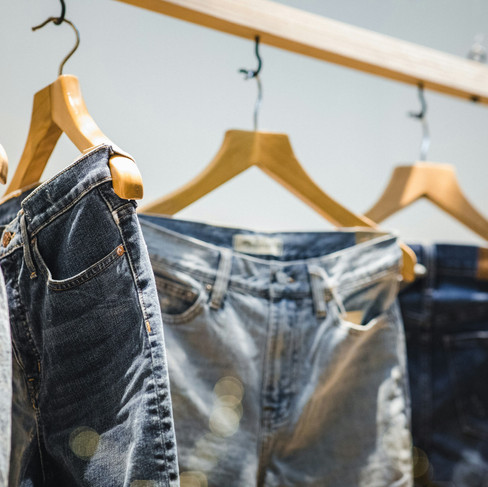Tips for Extending the Lifespan of Your Clothes: How to Make Them Last Longer
- ARTE.M Association
- May 17, 2024
- 5 min read
Sustainablity in clothes is not only the habit of buying less, upcycling clothes and buying vintage preloved items instead of new ones...it is also the practice of proper clothing care....
How to keep your favorite garments looking great for longer? Let's chat about it now.
The first point might be unexpected for your mum, but we're certain you'll be able to make your case after reading our article.
Wash your clothes less frequentl if at all! Yeah, Mum, I'm not washing my jeans!

Simple laundry rules
Wear clothes multiple times before washing, unless they're visibly soiled or odorous (except for underwear).
Denim and sweaters require even less washing.
High-quality materials, when properly cared for, can last a long time.
To freshen up clothes try freezing them overnight or airing them in the sunlight (avoid prolonged exposure to prevent color fading).
If you're not ready to skip washing altogether, aim for at least ten wears before laundering.
Sweaters can be worn four or five times, or even more with layered undershirts, before needing to be washed. Fewer washes help maintain their shape and softness.
To ensure your clothes last longer: Sort your laundry before washing to prevent color bleeding and shrinkage
Separate whites from darks, heavy fabrics from lighter ones, and soiled clothes from the rest.
Read the label instructions carefull to determine the appropriate washing method.
For delicate fabrics like cashmere and wool, use a gentle cycle with low temperature and spin speed, and avoid tumble drying.
Hand wash silk, linen, and other delicate fabrics in lukewarm water with a gentle detergent.
Avoid wringing out delicate clothes as it can damage the fabric.
Cut Down on Detergent Use and Avoid Overfilling Your Washing Machine
Stuffing your washing machine full might seem more economical as you reduce the number of washes, but your clothes don’t have enough room to wash properly.
They also rub together, causing fading and damage.
Plus, having proper washing space means you’ll need less detergent, another leading cause of damage.
Detergent can build up in the fabric, causing it to become stiff. Dirt and hard water chemicals get trapped in accumulations over time, causing garments to seem worn and unclean.
Detergents are also full of harsh chemicals which can irritate your skin, giving you rashes and skin conditions like dermatitis.
Laundry detergents made from natural ingredients, such as soap nuts or eco-friendly products like Blueland, are safer for your skin, clothing, and the planet.
You can also add half a cup of baking soda directly to the drum to act as a detergent booster, lessening your detergent needs further.
Wash your clothes inside out to preserve color and shape, especially for jeans
Opt for a delicate setting or hand wash denim to minimize wear.
Set the dye in dark jeans by soaking them in cold water with white vinegar and salt before washing.
Cold water helps keep fabric fibers closed, preventing dyes from running and preserving color.
Wash bright or dark-colored clothes inside out in cool water to maintain vibrancy.
Consider washing printed T-shirts inside out to prevent peeling or cracking of the designs.
Wash all clothes in cold water to minimize shrinkage and fabric deterioration, as hot water can accelerate wear and tear.
Air-dry your laundry whenever possible instead of using radiators or heated dryers
Natural drying helps prevent shrinkage, fading, and loss of elasticity, especially in synthetic fabrics like activewear.
Dry light-colored clothes outdoors to benefit from the bleaching effect of sunlight, while drying dark-colored clothes indoors preserves their colors.
Be mindful of prolonged sun exposure to prevent fading.
If machine drying is necessary, use dryer balls to reduce static and absorb moisture, thereby cutting down on drying time.

Quickly Remove Stains
It will be considerably more difficult to remove the stain if you wait for it to dry before applying the treatment.
In general, run cold water over the stained area immediately; however, some stains, such as grease or wine, are more difficult to remove and call for alternative approaches.
Stains may be set in and colors might fade or run in hot water.
Blot the spot with a stain remover stick before washing the clothing straight.
To remove wine stains, try holding the stained item under cold running water with the wrong side up for a few minutes. Then, soak it in a mixture of cold water and oxygen bleach for at least four hours before washing.
A mixture of half vinegar and half cold water can remove grease marks.
A mixture of laundry detergent and water, followed by a vinegar flush, will cure tomato sauce .
To iron your clothes effectively and maintain their quality
Begin by lightly spraying the clothes with water or using steam to slightly dampen them, making it easier to remove wrinkles.
Turn the clothes inside out before ironing to prevent them from developing a shiny appearance due to overheating.
Use the appropriate temperature settings on your iron based on the fabric of the garment, and always check the label for specific instructions.
Familiarize yourself with clothing labels to recognize the symbol indicating garments that should not be ironed.
If your clothes are not suitable for ironing, consider using a steamer to remove creases or hanging them in the bathroom while you take a hot shower for a similar effect.

Store clothes in a cool, dry place away from direct sunlight to minimize the risk of damage from moths, mold, or fading
If your storage area tends to be damp, especially during winter months, consider using a dehumidifier nearby to reduce moisture and preserve your garments.
Periodically check for any musty or mildew odors, paying special attention to drawers or areas that are rarely opened. Fungus thrives in dark, warm, and moist environments, so stay vigilant.
If you do detect mustiness or mildew, wash the affected clothes with white vinegar instead of detergent to effectively eliminate the fungus and keep your clothes fresh.
Everything you use, including the hangers, matters
Opt for wooden hangers over plastic or metal ones, as they provide better support and prevent stretching of the shoulders, which can lead to sagging.
Consider investing in satin padded or velvet-lined hangers for delicate garments, as they offer additional cushioning and grip to prevent slipping and creasing.
To maintain the shape and quality of your sweaters
Fold your knitwear instead of hanging them to prevent stretching.
Store them on a shelf in your closet in airtight bags when not in use, especially during seasons when they're not needed.
Rotate your winter and summer clothes every six months to wear them less frequently and keep them in better condition.
Know more-let us know!!! we'll add to this list
All photos we use from licensed stock
Unsplash+
Give a shoutout to
In collaboration with Minimalism Life®


























Comments